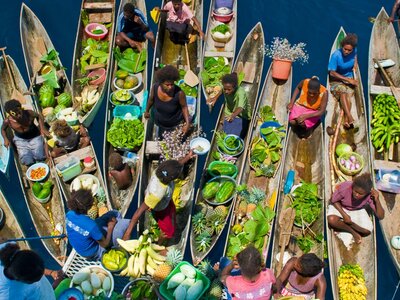The Pacific
- 2.5 million
- people dispersed across Pacific Island countries and territories – over 15% of the Earth’s surface
- 4
- number of Least-Developed Countries in region
- 20%-plus
- of GDP lost due to weather-related events
The Pacific Island Countries and Territories are among the most disaster-prone in the world, facing frequent and compounding hazards including tropical cyclones, volcanic eruptions, earthquakes, tsunamis and coastal flooding.
These recurrent shocks intensify underlying structural vulnerabilities. Supply chain and logistical constraints impede emergency response, service delivery and access to markets, while under-resourced telecommunications systems limit the reach and coordination of disaster efforts.
At the same time, fragile, import-dependent food systems contribute to a growing triple burden of malnutrition (undernutrition, overnutrition or obesity, and micronutrient deficiency) and non-communicable diseases. Together, these interlinked challenges not only deepen the region’s exposure to crisis but also erode its capacity to recover. Strengthening local systems, particularly in supporting governments in managing and mitigating disasters, is therefore central to advancing resilience and reducing disaster risks across the Pacific.
The World Food Programme provides government partners with technical assistance, coordination and training in supply chain and logistics, emergency telecommunications, and food security and nutrition. We enhance access to disaster risk financing and inclusive shock-responsive social protection systems that focus on those most at risk of being left behind.
What the World Food Programme is doing in the Pacific
-
Emergency preparedness and response
-
WFP Pacific plays a central role in enhancing emergency preparedness and response across the region, enabling governments and regional partners to act with greater speed and efficiency. Through its leadership in the Logistics, Emergency Telecommunications, and Food Security Clusters, WFP provides critical technical assistance, information management, and coordination support before and during emergencies. We also lead cash coordination and readiness efforts, ensuring flexible, people-centred solutions are in place ahead of disasters.
-
Supply chain and logistics
-
Emergency telecommunications
-
Food Security and nutrition monitoring
-
Disaster risk financing
-
Anticipatory action
-
Services upon request
The Pacific news releases
Go to pageIn focus
WFP Chief calls for strengthened partnership on climate and disaster preparedness during first visit to the Pacific
News release | 9 August 2023
WFP supports the Government of Vanuatu's response to Tropical Cyclone Lola with assistance from USAID
News release | 15 November 2023
Pacific Catastrophe Risk Insurance Company and WFP Partner to Reinforce Disaster Risk Financing in the Pacific Region
News release | 25 March 2024
Government of Samoa and WFP launch analysis to enhance access to healthy diets
News release | 25 November 2024
The Pacific Catastrophe Risk Insurance Company and the World Food Programme host joint workshop on disaster risk financing in Tonga
News release | 25 November 2024
Partners and donors
Find out more about the state of food security in The Pacific
Operations in The Pacific
Contacts
Office
• Address: Level 2, Ra Marama House, 91 Gordon Street
Suva,
Fiji







